CNN International vs. CNN US

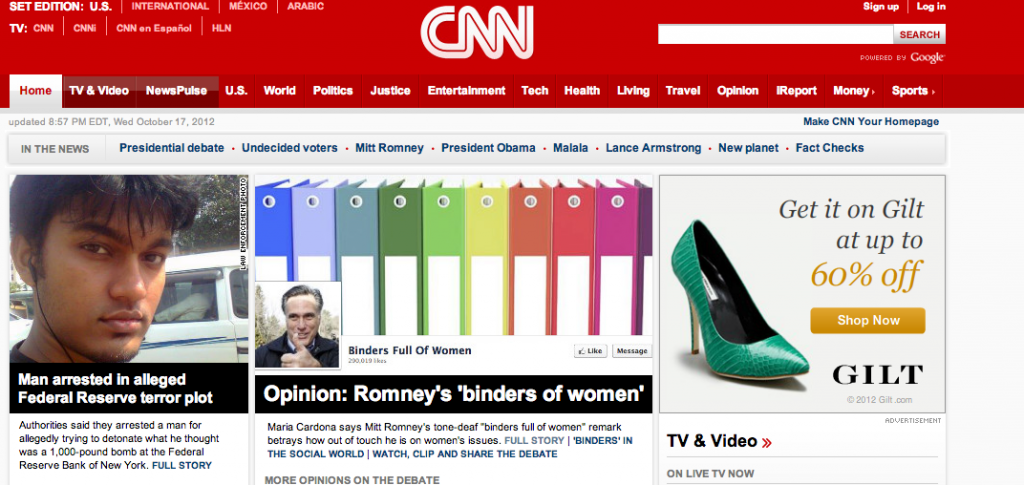
The top photo above is a screen shot of CNN.com’s International Edition. The bottom one is from CNN.com’s US edition. The two pictures were taken minutes apart, if that. The left story is the same. The center one couldn’t be more different.
The International version shares a story of a 14-year-old girl in Pakistan named Malala who is in the hospital after being attacked. “Her attackers have vowed to kill Malala for demanding education for girls,” says CNN. It’s outrageous and, in the U.S., unthinkable. It’s the type of story worth of front-and-center attention. Easily.
The CNN version shares an opinion piece. It’s authored by a partisan — a former DNC communications director — and, of course, takes issue with the man running for President on the other side. It discusses Mitt Romney’s “binders full of women” line from the Tuesday night debate. The first eye-catching quote: “Sounds kinky and not something you want to be touting.” CNN puts that front-and-center for us Americans.
Thanks for nothing, CNN.
Originally published on October 18, 2012The Biggest News in the Wiki World in Years
In 2005, I co-founded a wiki-based startup called ArmchairGM. We were acquired by Wikia in 2006, and I worked there through 2008. I’m one of few people out there who have used wikis extensively outside of the behemoth that is Wikipedia.
Another group, WikiTravel, started a few years before we did, and they sold to Internet Brands in 2006. Now, the community is revolting and leaving IB for WikiMedia (which operates Wikipedia). This post talks about why and the potential fallout.
If you’re interested in understanding how online communities thrive and whither, you really need to read that post.
Originally published on September 6, 2012How Outside Magazine’s Pagination Scheme Cost Them Money
Outside Magazine covers participatory sports and, by extension, professional cycling. They’re hawkishly covering the recent developments in the Lance Armstrong doping saga — and, in one case, adding to it. They ran an 11-page first-person account by Armstrong’s former Man Friday, Mike Anderson, and his less-than-positive experiences with Armstrong.
Eleven digital pages, that is.
Pagination online is a bit of a fiction. There is rarely, if ever, a technical reason for allowing all the text to appear on one page. Publications do it for readability, I guess, but more obviously, to increase the number of page views and therefore ad impressions (and therefore, revenue). But in the case of the Outside Mag piece linked above, it probably hurt them.
As of this writing, the article has about 2,500 Facebook “likes” and another 900 tweets. It’s shortened bitly link has about 11,000 clicks. Figure it did about five times that, and each click averaged three pages per visit, and we’re looking at 150,000 page views. As anyone who has ever published anything online knows, that’s a lot. A whole lot, in fact.
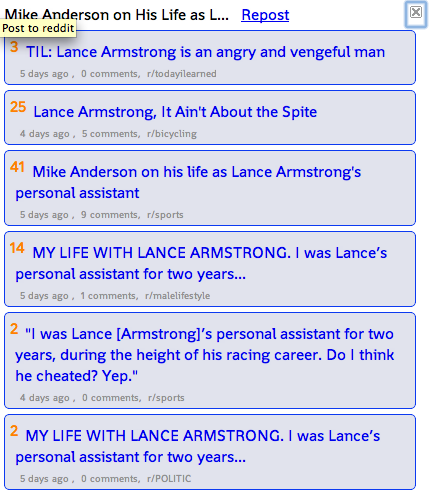
I have a Chrome extension install which shows me if a page has been submitted to reddit, and if so, how many times. I used that to see how reddit handled the page and took the screen shot above. For something so virally strong, you’d think that it’d do better that a couple of middling posts topping out at 41 net upvotes in the sports subreddit (which at about 70,000 subscribers is pretty small).
What’s going on? There’s a one-page, ad-free printable version available. There’s a link to it in the right sidebar of the main article. That article has 4,300 bitly clicks, so it spread via Twitter pretty well, too. And on Reddit?
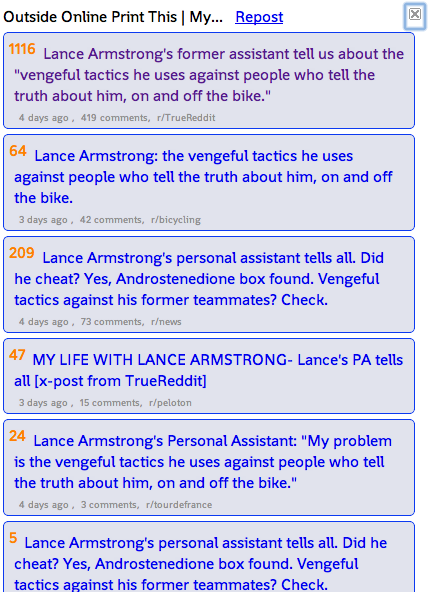
That 1,000+ one is a front page hit. The 209 probably hung around there too. And there’s another 100+ which got cut off. My guess is that the printable version did about 50,000 uniques — uniques which never saw the ads.
Outside may have come out ahead here, but I doubt it. They traded in a lot of uniques for a lot of secondary and tertiary page views. And they have a lightbox popup for new readers, asking them to subscribe — but, of course, not on the printable page.
What’s odd, though, is that Outside Mag has a single-page, ad-laden version of the article. There’s no obvious link to that page anywhere — and I perused the page source in hopes that there was one there, somewhere. That could have been the reddit link. But it wasn’t. It did about 800 clicks via bitly. It was submitted to reddit once with six upvotes. Only six.
I’m not here to pick on Outside Mag. Most places make this mistake. But here’s the key thing:
Those who share well care about the people they share with. They’ll do whatever they can to make it better for that audience. Give them what they want — everything on one page, somehow, please! — or they’ll figure it out anyway. And you’ll lose.
Originally published on September 5, 2012No Analytics
When I worked at Wikia, we had a lot of conversations about incentives. Mostly about user incentives but the same applies here to me. (I guess I’m the “user” here anyway. Maybe.) When you incentivize a behavior, people bend toward the incentive, not toward the intended behavior. So lots of unintended things pop up.*
I’m not sure what I’m trying to do here, but I do know that I don’t particularly care about most of the stuff Google Analytics is going to tell me, at least not now. On top of that, most of the data is going to be noise and I’m the type of person who will try to divine signal from that noise. I don’t want to “optimize” toward that. I just want to get my thoughts down somewhere. So, no analytics.
* The example of unintended consequences that we discussed at Wikia were edit counts on Wikipedia. Many hard-core Wikipedia editors would wear their edit counts as a badge of honor. (There’s even a scoreboard of sorts for this stuff.) That values quantity of quality and, when edit counts are used as a threshold for leadership (which happened on some smaller Wikia wikis), quality degrades, quickly, and the community can fall apart too.
Originally published on August 31, 2012OMG and the Hopeful Moment: The New SEO
Will Leitch has an interesting article up on Sports on Earth titled “The Age of ‘OMG! LOL!’ in Sports Media,” where he argues, basically*, that long-form sports journalism is withering in the face of “the tiny morsel that [feels] like it had the best chance of getting attention on Twitter.” (That’s me quoting Leitch quoting Buzzfeed’s Ben Smith. Yikes.) It sucks because it means that all these great articles of two, five, ten thousand words are going unread by the masses while, instead, the masses are fed two sentence takeaways like “Clint Eastwood yelled at a CHAIR! LOL!” or something like that.
* Leitch’s linked-to article is a tad over 1,000 words. I realized I just boiled it down to one run-on sentence. You should read the whole thing, if for no other reason than to absolve me of the obvious crime I just committed given the context. And because if you are interested in the confluence of media and technology, it’s a good piece.
I left a comment there but I am going to hash it out a bit more here. (Here’s why. That’ll be true for most posts, I hope.)
The big thing: The “OMG!” attention culture Leitch bemoans is not a replacement for long-form journalism. It’s an enabler of it.
Answer this question and you’ll see why: “How are you going to get 1,000 people to read what you wrote?” And by “read,” I mean really sit down and read every word, thinking about the nuances.
For most of us the answer is you can’t. You don’t have the distribution channels.
The Internet causes massive media fragmentation. We’re no longer getting our information from the local newspaper, major radio/TV networks, etc. We’re getting it from seemingly everywhere and in little tiny bits from each. Publishers are having a harder time reaching their (old) audiences because the audiences aren’t as wed to them as before. Search engine optimization (SEO) is one of the ways around that, but that requires that the intended reader know what they want before they find it. If you are publishing reviews on high-end digital cameras, Google can get you readers. If you are trying to argue that X should do Y so Z can happen, not so much.
What you have, instead, is a “hopeful moment.” It’s the few seconds someone lands on Aol’s or Yahoo!’s homepage after checking their email; the time they scan their Facebook newsfeed; the dozen tweets they see before they move on to something else; etc. You have a couple sentences, if that, to catch their attention, and to make matters worse, you don’t get to write that sentence. Someone else has to do it for you, because you don’t run the major digital media homepages, you aren’t everyone’s friend on Facebook, and you probably don’t have all that many Twitter followers.
So other people read your stuff, boil it down to these 10 word attention-grabbers, and if it works, the masses become aware of your article. But most of them don’t read it and even worse, they mischaracterize it. (Leitch takes solace in a piece honest criticism a 4,000+ word piece of his received: “Finally, someone had at least read the whole thing.”)
But so what?
Those which get hooked in by that hopeful moment may spread your article, sharing nuance-free summaries with, hopefully, a link. Maybe that picks up steam. Most people — as in ninety percent if not much much more — will be satisfied with the oversimplified and imprecise takeaway, and some of those people will share the article without further introspection. And that’s not OK.
It’s great.
All these people sharing your stuff — even in the basest way possible — will help a part of your intended audience find your thoughts. That audience will read every word. And you couldn’t have gotten there otherwise.
Originally published on August 31, 2012
Faux Realism on Twitter
I use Hootsuite as my desktop (okay, laptop) Twitter client. The third column highlights whenever someone tweets out a link to an issue of Now I Know. A couple of days ago, this happened:

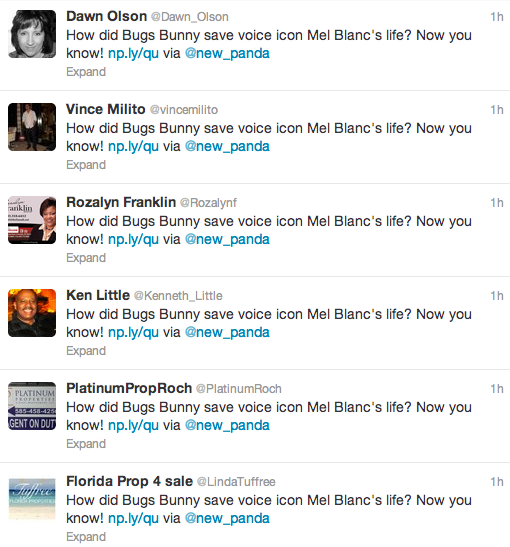
Wow. What happened there?
Look through the accounts and you’ll see that most of them are real estate agents. They’re using a service called New Panda which, according to the linked-to page, features “Auto-Pilot Social Posts”:
“We’ll deliver a carefully planned, written set of content that will automatically post to one or more of your social networks. You decide which post types you like. You can always cancel or reschedule a post in advance. When you don’t have time to actively manage your accounts, we’ll keep you engaged with your audience and generate new comments, leads and referrals. Easy. Brilliant.”
Does it work? I’m skeptical, but here’s the traffic graph for the page these somewhat-automated accounts linked to:

The bounce isn’t huge — only about 50 or 60 more than the average day. Most of them actually come from Facebook:
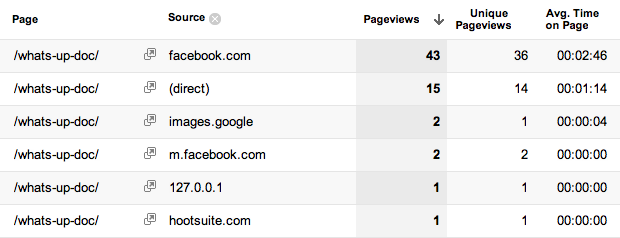
I assume the 15 “direct” visits are from Twitter. It looks like these half-bot, half-human accounts are delivering some value to their followers. Paint me surprised.
Originally published on August 30, 2012
Finding the Everyday Expert
Here’s a question:
Are journalists supposed to be experts? Or are they supposed to report on what the experts believe?
And how does technology change this?
Okay, that’s three questions. But let’s treat them as one.
Last week, Lance Armstrong surprised many when he decided not to continue his fight against the U.S. Anti-Doping Association’s allegations of performance-enhancing drug use. As a big sports fan, I follow a lot of other sports fans on Twitter. Many of them also follow beat writers and sports columnists. Sports journalists weighed in on what Armstrong’s statement meant, and many of those were retweeted into my stream. The vast majority took Armstrong’s statement as a confession.
Here’s one example. Pittsburgh Tribune-Review sportswriter Dejan Kovacevic’s tweet, below, found its way into my timeline:
I do not mean to single him out. I know very little about him — I’ve seen his name hit my timeline talking about baseball, and that’s basically it. If you look at his recent columns, they’re about baseball and the Olympics, and his blog also talks about football. And the lack of cycling commentary is striking. On the weekend of the biggest cycling news in years, he was on vacation, and did not address the topic on his blog upon his return.
None of this is to say that Kovacevic is a bad writer. If anything, it looks like he’s very well respected and liked by Pittsburgh sports fans. And when it comes to whether Armstrong used PEDs, he may be right. I don’t really know.
But his opinion is supposed to count. The problem: His expertise in cycling is minor at best. Most sports writers do not follow cycling except during a major event like, say, the Tour de France. They aren’t lawyers, either. Their expertise here is limited to the fact that they work in a newsroom and cover major American sports.
On the other hand, a friend of mine, let’s call him John, is an avid cyclist and fan of competitive cycling — and he’s a lawyer, too. Here was his take, posted to Facebook:
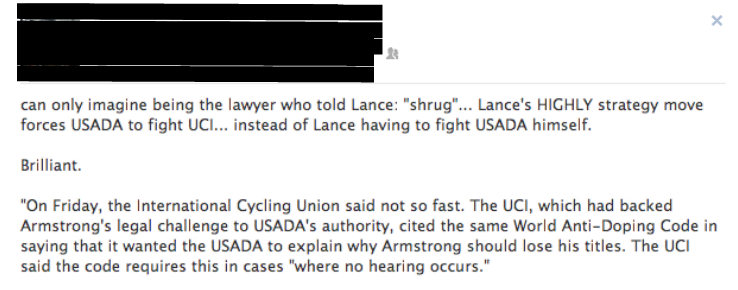
That, of course, sparked some comments. Here are two, with my friend John as the second speaker:
That conversation could have happened between Kovacevic and John, and to the benefit of Kovacevic’s readers. At some point, it will. The question is whether guys like Kovacevic will adapt in time.
Originally published on August 28, 2012
